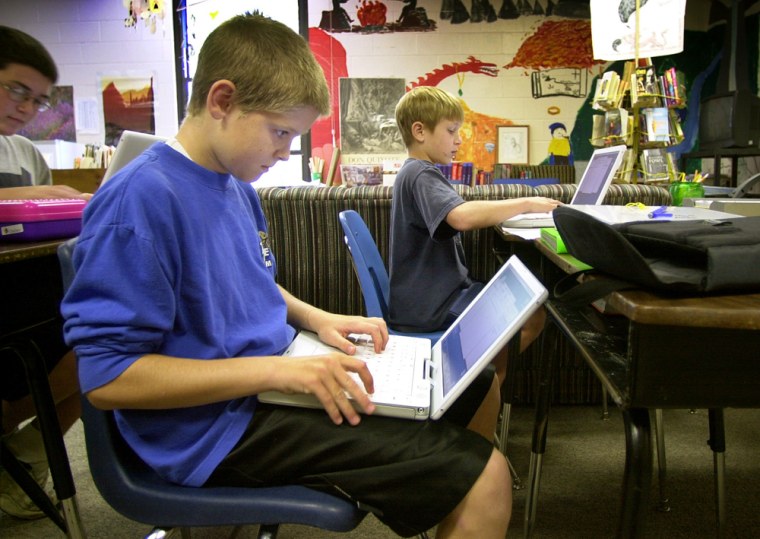Does a child learn better when he or she has a laptop to use in the classroom?
In the United States, Maine has led the way with its laptop program, which has made students more enthusiastic in the classroom, but not necessarily resulted in better test scores.
The state started its laptop program for 7th-graders in 2002, and later expanded it to 8th graders and to one-third of the state's high schools. Maine is spending $90 million through 2010 with Apple to supply computers, software, warranties, technical support, training for teachers and installation of Wi-Fi networks in all middle schools across the state.
Every year, about 43,500 students and teachers get their own iBooks, which cost about $600 each. The state of Maine says students can take their iBooks home after school and keep them during vacations.
The feedback from inside the classrooms has been pretty positive. More than 80 percent of instructors say the laptops help them make lessons more personal to students, make it easier for students to study problems from the real world and to dig deeper into certain topics, according to a survey by the Maine Education Policy Research Institute, established by the Maine legislature in 1995.
Many teachers who were surveyed also said that students using laptops are becoming better at combining information from multiple sources and expressing their thoughts. Students in the program report that they understand the material better.
But whether its program can measure up to the federal government’s key yardstick — improvement in standardized test scores — is another question.
“What you can do on laptops isn’t measured on current standardized tests,” said Mark Warschauer, an education professor at the University of California in Irvine and author of “Laptops and Literacy: Learning in the Wireless Classroom.”
Preparing students for work world
Maine teachers help students sift through vast data on the Web in all subjects, including language arts, social studies and science.
Students can access the most current information on their laptops, opposed to books, which may quickly become outdated. Maine maintains its students are learning “21st-century skills” such as collaborating, collecting pertinent information on the Internet — and spawning original ideas.
"Employers are more supportive in certain industries because they might care less what somebody’s test score was than do they have the innovative abilities necessary to succeed?" Warschauer said.
Not everybody thinks that laptops in the classroom is a good idea.
Some schools’ programs around the country have faced widespread computer glitches, teachers not knowing how to teach with laptops — and to a much lesser degree, yet way more publicized — the issue of students using the Web to cyberslack, cheat and view porn.
Maine has been criticized for not studying whether laptops land more students on the honor-roll list, according to “America’s Digital Schools 2008.”
“What we need to look at is the broader impact on student improvement,” said Timothy Magner, the director of the Office of Education Technology, a branch of the U.S. Department of Education. “One of the key metrics is test scores. We’re keenly interested in that.”
Attendance up, detentions down
Maine’s laptop program has had other positive effects. From the beginning of the program, class attendance rose and detentions dropped.
The reason: The laptops seem to better grip the attention of 7th- and 8th-graders, who are tech-savvy multi-taskers. Three-quarters of Maine’s middle school students say they like school more since getting their own laptops, according to a study by the Maine Education Policy Research Institute.
Statewide test scores haven’t changed much. But a study led by University of Southern Maine professor David Silvernail found that the average 8th-grader using a laptop did score significantly higher on the writing part of a statewide exam called the Maine Educational Assessment.
Students earned higher marks on the handwritten test despite mainly writing on their computers during lessons — aided by a spell-checker. Silvernail’s new research focuses on whether laptops might help Maine students grasp pre-algebra.
“Maybe the full potential of the laptop isn’t being realized,”" he said.
Meanwhile, all teachers in the program will continue to go through training this year, which researchers have found is critical to the program’s success.
Same opportunity for all students
Bette Manchester, the first director of Maine’s laptop program, said the state also wants to use its laptop program to solve an age-old educational problem: How to offer every child the same opportunity at a quality education. She now is head of a private research center, Maine International Center for Digital Learning, which is developing new approaches for the laptop program.
The laptops might help breach the economic barrier to school success. Silvernail found that on statewide writing exams, economically disadvantaged students using laptops did outperform advantaged students who didn’t use their computers.
Still, the laptop program has faced setbacks. Maine wanted to expand its laptop program to all high schools four years ago, but state budget cuts have prevented that.
“There’s no question that there’s enough good results to say that we need to keep going,” said Manchester.
